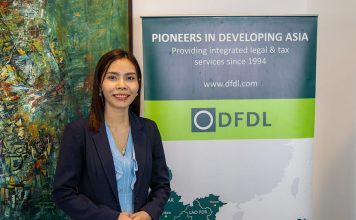
We meet the social impact worker Aimee Veuve, who believes that sustainability, opportunity and fair pay lies at the heart of the Cambodian workforce’s untapped potential.
With Phnom Penh’s rapidly spreading construction facelift and the expected continuation of the year-on-year 7% GDP growth rate, it’s easy to be seduced by news of Cambodia’s swift transformation. Yet despite the progress, the current workforce has borne the brunt of Cambodia’s history of poverty and lax education standards. It’s often down to businesses themselves to provide the confidence and training for their staff, whether out of an ethical drive or simple necessity.
Aimee Veuve is the director of development at NGO Aziza’s Place, a learning centre for children of dumpsite workers. She oversees a social enterprise, Aziza’s Coffee, which employs the mothers of Aziza Place’s pupils. She also co-founded Impact Hub Phnom Penh, a co-working office space offering business support, workshops, events and networking opportunities to start-ups and social entrepreneurs.
Well-versed on social impact businesses, HR and skill building issues, Veuve has experienced the extreme end of the national skill shortage. “One of my staff [at Aziza’s Coffee] is just over 40 years old and could not read or write when we recruited her,” she recalls. “She lacked so much self-confidence at the beginning and it was clearly not easy for her to make such a large and unfamiliar change in her life. Her self-confidence grew; she’s taken on more responsibility. She makes me want to find more women like her, who were not given the same opportunities as many of us but relish the challenge when it comes their way.”
Social Success
What makes a social business successful in giving a leg up to this disempowered sector of the workforce? For Veuve, “sustainable impact is about creating social value in the longer term; it has to last, not create dependency. The social impact or value should be the same or greater through time.”
“I see a lot of short term impact which creates dependency in the development sector, and there’s a movement and opportunity in Cambodia to do things differently now.”
She believes that long-term projects are needed to counter the skills shortage. “I have come across some people who really impress me, and in some areas I can really see a skills gap. In a lot of cases, a one-day training course just isn’t the answer. I would like to see more opportunities for young Cambodians to gain hands-on training and to strengthen their CVs.”
Reconsidering the non-profit mantra
Veuve believes in the benefits of a profitable social enterprise that can grow and sustain itself. Success as a social enterprise “can be achieved whilst also being profitable, and this is unfortunately perceived as a negative outcome in social business which shouldn’t always be the case,” says Veuve.
“There is also a big challenge that, on paper, Cambodia is wealthier than before. Unfortunately this doesn’t account for distribution; 40% of Cambodians still live on less than $2 a day. The nation’s wealthier ranking means that grants and donations are much harder to obtain now and so organisations are looking at creative ways to generate their own income.”
Fair wages, loyal staff
Veuve sees employer’s unwillingness to pay decent wages as a large factor of the country’s notorious staff retention problem. “I would say offer a salary that is sustainable both for the organisation and for the employee, and is enough for them to live off.”
“If it is a full-time job, please offer a full-time salary so that your employees don’t have to find a second job and are constantly exhausted or unmotivated when they come to your workplace. If you cannot afford a full-time person in your business-as-usual state, then see if that role can be made into a true part-time role, or maybe your organisation’s business approach needs reviewing. If you ask staff why they are jumping from job to job, it’s mainly because they’re chasing a higher salary.”








